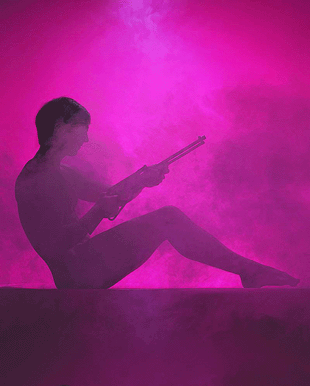Susan Sontag’s “A Parsifal” laid bare, with no small amount of ambiguity
It’s not hard to see what would attract Susan Sontag to the story of Parsifal, the Wagnerian hero who finds redemption when brandishing his sword to heal, not inflict, wounds. Sontag, who died in 2004, was an outspoken pacifist, going so far as to stage a production of “Waiting for Godot” in Sarajevo while the city was under siege. Theater, for her, was balm.
In Sontag’s playlet version of Wagner’s opera, “A Parsifal,” she treats the title character as a naïf-turned-despot—a George W. Bush avant la lettre. “I was ignorant,” says Parsifal, as if explaining the absence of WMDs. “And yes, I did know, know that not speaking, withholding information, confers great power.”
So John Jahnke’s recent production of “A Parsifal” wins points for topicality. (Sontag published the play in 1991, but Jahnke gave it its first public airing at P.S. 122 February 23 through March 5).
But political critique isn’t the only thing on this promising young director’s mind. The allure of a forceful style clearly interests Jahnke. He stages “A Parsifal” as a kind of Robert Wilson pageant, all white scrims and long pauses. Which is perhaps apt, since Sontag’s playlet first saw light as an introduction to a monograph on Wilson, the opera director famed for his ponderous minimalism.
In Jahnke’s take of “A Parsifal,” symbols infect everything. White feathers fall from the ceiling. A pregnant woman gives birth to a radiant egg. Sunday orators, the actors declaim their words to the audience, or the ether, never each other. If you manage to miss the message, the costumes by Pilar Limosner, with their chic Helmut-Lang militarism and reduced palette of white, black, and blood-red, carry the meaning.
What the actors weren’t wearing often made a stronger impression than what they were. Jahnke underscored Parsifal’s innocence by sending him out at the play’s beginning completely starkers—except for the Uzi cradled in his buff arms. Parsifal (Gardiner Comfort, with a ingenuousness reminiscent of Brendan Fraser) finds himself in a mysteriously codified realm whose rules elude him. Conflict flares when he kills a sacred swan. Vaguely chastised—everything in this production is vague—he then comes under the guidance of a watchful ostrich (played with amusing tartness by Ridiculous Theater alum Black-Eyed Susan). The stunning and often unclothed Okwui Okpokwasili is Kundry, a temptress who attempts to lure Parsifal to the “dark” side. Or is she in fact a victim of the regime change, which Parsifal spearheads? Much is unclear. A Christ narrative, a Henry IV story, and “Apocalypse Now” scenarios all suggest themselves, in the absence of a clear plot.
Jahnke does eke out some arresting tableaux from Sontag’s arch text. A smartly choreographed press conference—Parsifal is held accountable for his misdeeds, with the assembled crowd raising their hands to ask questions that are never voiced—is strangely poignant. Was it because Parsifal seemed sorry less for his transgressions than for his need to perpetrate further blandishments in the name of “coming clean”?
And Okpokwasili’s harrowing rendition of “Sometimes I Feel Like a Motherless Child,” as she lay withering on the bed of a hospital gurney, scorches.
Still, the fullest pleasures of “A Parsifal”—for better or worse—are visual. None more so than the bare-skinned phalanx of Bel Ami stand-ins who comprise the knights of the Holy Grail. Erect, silent, simmering, they give living proof to the often-supposed homoeroticism of military life. Jahnke capitalizes on this tension when, at the end of the play, he has Parsifal kiss one of the knights, who then passes this intimacy on to the next knight, until the whole fleet is linked in a daisy chain of pacifism.
I’m torn. On the one hand, turning Parsifal’s nation-state into a kind of übermensch skin-show makes explicit the queer connections between Sontag’s political writings (“Fascinating Fascism”) and her interest in aesthetics (“Notes on Camp”). But I wonder if the seductiveness of Jahnke’s knights—the parade of male muscle—undermines Sontag’s anti-war position. Isn’t it all a bit too Leni Riefenstahl–esque? Perhaps if the knights weren’t so aestheticized from the start, so postured for visual pleasure, the play’s final make-love-not-war gesture would prove a more complete transformation. Instead, it panders to a yen for skin more easily sated by US Weekly and bedfellow.com.
gaycitynews.com

































